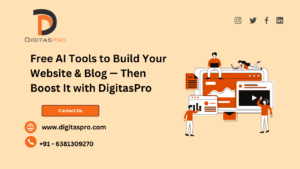Introduction
The digital landscape is evolving faster than ever, and one of the most exciting transformations is the rise of AI website design tools. Once, building a professional website required skilled developers, designers, and weeks of effort. Today, artificial intelligence can create fully functional, responsive, and visually stunning websites in a fraction of the time.
At DigitasPro Technologies, we believe AI is reshaping the future of website creation. This comprehensive blog (approx. 3000 words) explores AI website design tools in detail—what they are, how they work, their benefits, limitations, and the future of web development.
What is an AI Website Design Tool?
An AI website design tool is a platform that leverages machine learning and artificial intelligence to automate the process of creating websites. These tools don’t just provide templates; they:
- Suggest layouts based on your industry
- Generate text and image content
- Optimize websites for SEO and speed
- Personalize design based on user needs
In short, AI empowers anyone—regardless of technical expertise—to build a professional-grade website.
Popular AI Website Design Tools in 2025
- Wix ADI (Artificial Design Intelligence) – Answers a few questions and instantly generates a ready-to-use website.
- Bookmark AiDA – AI-driven platform focused on small businesses and e-commerce.
- Zyro (Hostinger AI Builder) – Known for AI content writing and SEO tools.
- Squarespace AI – Best for creatives, portfolios, and branding.
- Framer AI – Converts text prompts directly into live, editable websites.
Features of AI Website Design Tools
- Automated Design: Instantly generated layouts.
- AI Content Creation: Copywriting, blog posts, product descriptions.
- SEO Optimization: Metadata, alt text, and keyword suggestions.
- Responsive Design: Mobile-first, fully adaptable.
- E-commerce Ready: Storefronts, payment gateways, inventory.
- Analytics: AI-powered heatmaps and personalization.
Benefits of AI Website Design Tools
- Faster Launch Times – Websites ready in hours.
- Cost Savings – Eliminates the need for large dev teams.
- Accessibility – Easy for beginners to use.
- Scalability – Add features as business grows.
- Data-Driven Optimization – Continuous performance improvements.
Challenges & Limitations
- Lack of Unique Creativity – AI can’t fully replace human imagination.
- Customization Boundaries – Limited compared to coding from scratch.
- SEO Depth – Advanced optimization still needs expert input.
- Over-Reliance on AI – May result in generic or repetitive designs.
- Security Concerns – Sensitive data must be protected.
AI vs Traditional Web Development
| Aspect | AI Tools | Traditional Development |
|---|---|---|
| Speed | Hours/days | Weeks/months |
| Cost | Low/Medium | Medium/High |
| Customization | Limited (improving) | Unlimited |
| Skill Needed | Minimal | Advanced (coding/design) |
| Maintenance | Mostly automated | Manual or team-based |
Use Cases
- Small Businesses: Affordable online presence.
- Startups: MVP websites & landing pages.
- Enterprises: AI-driven personalization at scale.
- Freelancers: Portfolios, branding, and quick turnarounds.
The Future of AI Website Design
- Prompt-to-Website: Entire sites built from simple text prompts.
- AI + AR/VR: Immersive, interactive websites.
- Predictive Design: AI anticipates user behavior.
- Voice-Driven Creation: Websites built by spoken commands.
- Generative AI: Custom visuals, banners, and branding built directly into tools.
Conclusion
AI website design tools are transforming the way businesses establish their online presence. From small startups to large enterprises, AI provides speed, efficiency, and creativity while keeping costs low. While human designers will always play a critical role in branding and storytelling, AI offers the foundation for the future of digital presence.
At DigitasPro Technologies, we help businesses leverage the power of AI web design to stay ahead in the digital age.
FAQs — AI Website Design Tools
Q1. Are AI website builders free?
Some are free, but advanced features require subscriptions.
Q2. Can AI replace web developers?
Not completely—AI automates structure, but unique branding needs humans.
Q3. Are AI-generated websites SEO-friendly?
Yes, but expert optimization is still valuable.
Q4. Can AI design e-commerce stores?
Yes, with payment gateways, product pages, and inventory.
Q5. Do AI tools support multiple languages?
Many now support multilingual content creation.
Q6. Can I edit AI websites later?
Yes, most tools allow manual adjustments after AI setup.
Q7. Who benefits most from AI website builders?
Small businesses, startups, freelancers, and SMEs.
Final Word:
AI website design tools represent the future of web development—fast, intelligent, and accessible. By blending automation with human creativity, businesses can scale faster and create impactful digital experiences.

